

The 7 Different Team Roles Of Buurtzorg's Successful Self-Managed Teams. Last Sunday we wrote that self-managing teams are not new—they were already described in the academic literature as early as the 1950s.
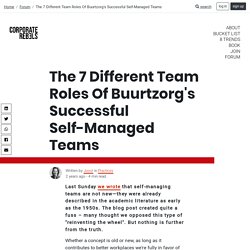
The blog post created quite a fuss – many thought we opposed this type of "reinventing the wheel". But nothing is further from the truth. Whether a concept is old or new, as long as it contributes to better workplaces we're fully in favor of it. In fact, there is much to learn from the best-of-class self-managing organizations that successfully put this powerful concept into practice. Clearly, one of these is Buurtzorg, the Dutch health care organization that employs ~14,000 nurses. The Key to Better Strategy? Think More, Collaborate Less. Introversion within Diversity, Inclusion, and Belonging. Mark Cuban: This 1 Personality Trait Makes You Golden in the Eyes of Your Boss.
Just landed a perfect-for-you job?

Awesome. Now it's time to prove your boss that she made the right decision to hire you. Play your cards right, and you'll become an invaluable member of the team and hopefully earn a promotion down the line. To get to that next level, let's take a chapter out of Mark Cuban's book. The sage billionaire, Shark Tank star, and owner of the Dallas Mavericks recently spoke with Money magazine about the skills he finds most valuable in employees. How to Manage a Team of All-Stars. Executive Summary Teaming people with different skills and perspectives together almost always produces more output than the sum of those individuals acting alone.

But with star talent, this relationship is more extreme: productive power increases geometrically with the percentage of star players on a team. A five-member team, comprised entirely of A-players, can produce 16 times as much output – or the same output in one-sixteenth the time – as the sum of five average players working individually. And the best companies are more than 25% more productive than the rest due to the way they deploy, team and lead scarce, difference-making talent. Adam Grant: Are you a giver or a taker? 5 things that resilient teams do differently. High-Performing Teams Need Psychological Safety. Here’s How to Create It. Executive Summary The highest-performing teams have one thing in common: psychological safety — the belief that you won’t be punished when you make a mistake.
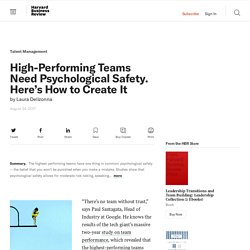
Studies show that psychological safety allows for moderate risk-taking, speaking your mind, creativity, and sticking your neck out without fear of having it cut off — just the types of behavior that lead to market breakthroughs. So how can you increase psychological safety on your own team? Research: How Teamwork Powers Mindful {and Effective} Leadership. Why is genuine teamwork elusive? – The Mission. If you could get all the people in an organization rowing in the same direction, you could dominate any market, against any competition.
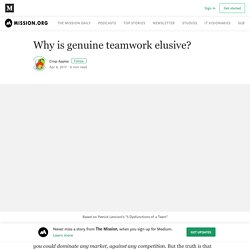
But the truth is that genuine teamwork remains elusive in most organizations, and team leaders and members fall unknowingly to the 5 dysfunction pitfalls. Patrick Lencioni told a leadership tale in his book about how Kathryn, the new CEO of a once-promising but now-failing company, managed to bring the unconsciously dysfunctional executive team into a cohesive and effective team, to illustrate an actionable model which is applicable to any team. I thought it’s worth sharing, if you haven’t got time to read the original. 1.
Absence of Trust The word trust is used so often and in so many ways that it has lost its impact. More than anything I’ve told by others, I see a trust problem here in the lack of debate that exists during meetings and other interactions among this team. To Build Connection on Your Team, Skip Icebreakers and Talk About Photography. Executive Summary Imagine looking at a photo of a single shoe on the sidewalk, or two people embracing, or a person walking alone into a cemetery.

Apple CEO Tim Cook on Collaboration. A 6-Year Study Reveals the Surprising Key to Team Performance (and 9 Ways to Enable It) Cognitive Diversity Helps Teams Solve Problems Faster - HBR Video. What Google Learned From Its Quest to Build the Perfect Team. So Rozovsky started looking for other groups she could join.
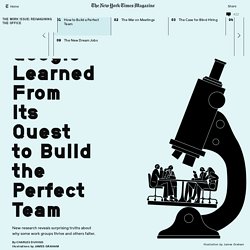
A classmate mentioned that some students were putting together teams for ‘‘case competitions,’’ contests in which participants proposed solutions to real-world business problems that were evaluated by judges, who awarded trophies and cash. The competitions were voluntary, but the work wasn’t all that different from what Rozovsky did with her study group: conducting lots of research and financial analyses, writing reports and giving presentations. The members of her case-competition team had a variety of professional experiences: Army officer, researcher at a think tank, director of a health-education nonprofit organization and consultant to a refugee program.
5 Ways to Build Trust Among Your Team Members. Trust is essential when building a healthy and productive work environment. Whether you’re leading an entire department or you work hand-in-hand with just a few coworkers, it’s important to build trusting relationships. Trust is essential to maintaining the company’s brand as well as supporting a healthy and fun work environment. Here are five tips to help build trust with both your coworkers and your superiors: Be Honest and Share Information Completely Be straightforward and honest with everyone, and expect the same in return.
Be Open to Others Don’t dismiss an idea simply because it doesn’t align with what you had in mind.Take everyone’s feedback into consideration before making a final decision and let others be heard. Stand Up for What You Believe In If you feel strongly about an issue, make sure you voice your opinion, but be prepared to share evidence to support your view. Six Common Misperceptions about Teamwork - J. Richard Hackman. By J.
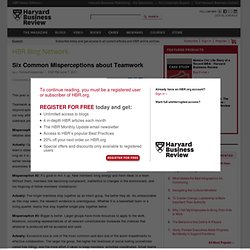
Richard Hackman | 5:50 PM June 7, 2011 This post is part of the HBR Insight Center Making Collaboration Work. Teamwork and collaboration are critical to mission achievement in any organization that has to respond quickly to changing circumstances. My research in the U.S. intelligence community has not only affirmed that idea but also surfaced a number of mistaken beliefs about teamwork that can sidetrack productive collaboration.
Here are six of them. Misperception #1: Harmony helps. Actually: Quite the opposite, research shows. The Clear Path to Great Teamwork. San Antonio Spurs Tribute - The Beautiful Game.